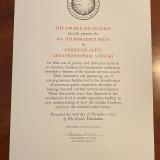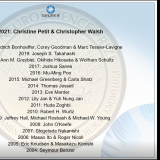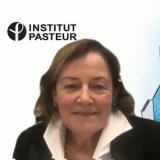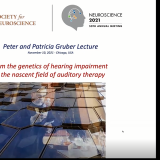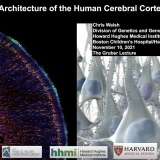2021 Gruber Neuroscience Prize
Christine Petit and Christopher A. Walsh have been pioneers in elucidating the genetic and molecular mechanisms that underlie human neurodevelopmental hereditary disorders. Both took the innovative—and novel at the time—approach of studying the genomes of geographically isolated consanguineous families to identify and map the genes responsible for hereditary hearing loss and malformations of the cerebral cortex. Then, using animal models and laboratory techniques they created themselves, they described how the expression of these genes affect the brain’s processing of sound and early development. Their research has profoundly transformed our understanding of how the human brain is formed and functions.
2021 Neuroscience Prize Recipients
Laureate Profile
Christine Petit, MD, PhD, a professor of genetics and cellular physiology at the Collège de France and the Institut Pasteur, has made landmark contributions to our understanding of the genetic and molecular mechanisms underlying hearing and hearing loss. By studying geographically isolated consanguineous families with a history of profound deafness—an innovative approach at that time—Petit mapped the first two genes involved in childhood autosomal recessive deafness (DFNB1 and DFNB2). She went on to identify more than 20 genes that cause hearing impairment. Using mouse models of human deafness, she developed in her lab, Petit then conducted a series of groundbreaking multidisciplinary studies in which she demonstrated how various genes, the proteins they encode, and their complexes affect the neurodevelopmental and neurophysiological processes involved in hearing. Petit’s work has had enormous clinical implications. It has unveiled the enormous genetic heterogeneity of early onset forms of deafness, transformed the diagnosis of hereditary deafness, elicited the underlying pathogenic mechanisms of numerous of them and with her colleagues, is developing promising gene therapies for both congenital and late-forming types of hearing loss.
Christopher A. Walsh, MD, PhD, Bullard Professor of Pediatrics and Neurology at Harvard Medical School, is one of the world’s leaders in the study of how genes and molecular mechanisms regulate the development of the human cerebral cortex. He has identified and described dozens of genetic mutations that underlie inherited disorders that affect either the structure or function of the cerebral cortex, including those that cause “double cortex” syndrome, periventricular nodular heterotopia, microcephaly, and certain types of epilepsy and autism spectrum disorder. Many of these findings evolved from one of Walsh’s key innovations—narrowing down the search for genes responsible for inherited brain disorders by first studying the genomes of geographically isolated consanguineous families with a history of those disorders. Walsh also pioneered the use of barcoded retroviral markers to trace neural progenitor cells in the developing cerebral cortex, as well as the use of single-cell sequencing to examine how somatic mutations shape cell lineage and cell fate in the brain. These techniques have led to paradigm-shifting discoveries about the creation of neuronal networks in both the healthy and diseased brain.
Watch Video
Citation
The Gruber Foundation proudly presents the 2021 Neuroscience Prize to Christine Petit and Christopher A. Walsh for their use of genetic and molecular methods to elucidate fundamental mechanisms underlying hereditary diseases of the human nervous system. Their innovative and pioneering use of consanguineous families led to the identification of numerous genes mutated in disorders of hearing loss and cerebral cortical development. These discoveries were then dissected at the mechanistic level in model organisms, leading to new understanding of how the cochlea functions and how the cerebral cortex forms.




